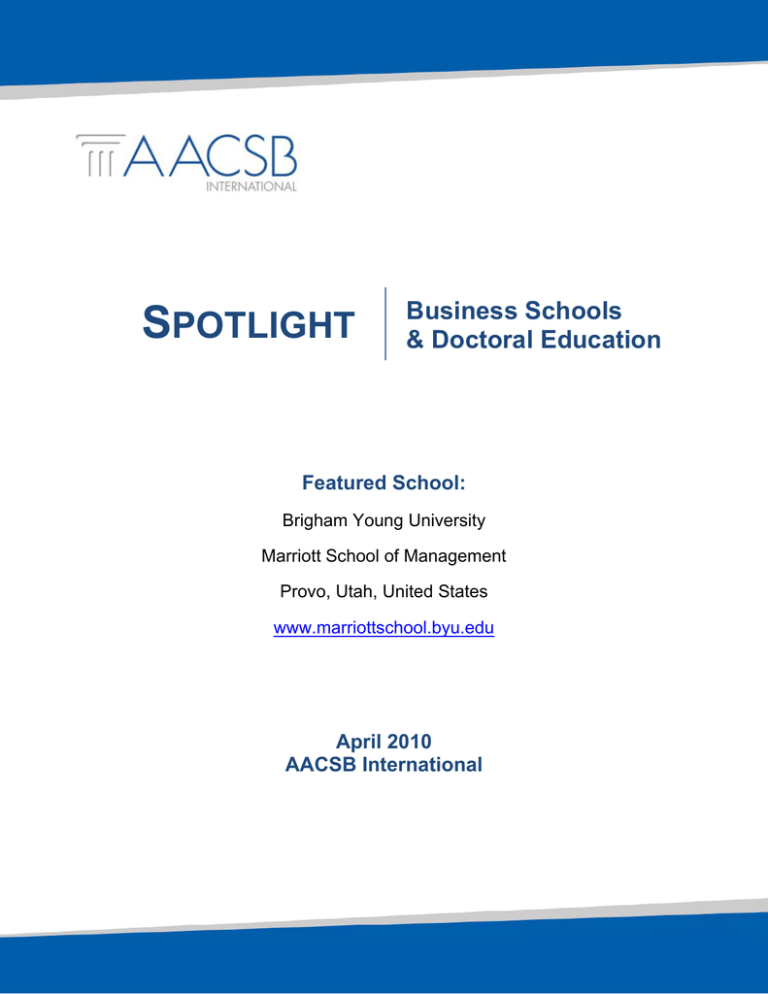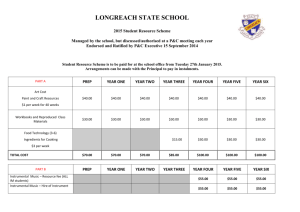
SPOTLIGHT
Business Schools
& Doctoral Education
Featured School:
Brigham Young University
Marriott School of Management
Provo, Utah, United States
www.marriottschool.byu.edu
April 2010
AACSB International
SPOTLIGHT | Business Schools & Doctoral Education
Brigham Young University | 2
School of Accountancy (SOA) Ph.D. Prep Track for MAcc Students
Although Brigham Young University (BYU) does not itself have a doctoral program, the Marriott School’s
Master of Accountancy (MAcc) program offers a specialized Ph.D. Prep Track1, which is designed to
prepare graduates from the MAcc program for doctoral studies elsewhere. Because accounting faculty
are in particularly high demand at business schools, especially in the United States2, earning a Ph.D. in
accounting is a particularly rewarding track for students interested in a career in business academia.
BYU began the School of Accountancy’s Ph.D. Prep Track in 1994, as a response both to queries by a
number of students interested in academic careers, and the perceived shortage of accounting faculty at
business schools that existed even then3. At first, the track began informally, generally taking the form of
individual mentoring of interested students who were working as research assistants to Professor
Douglas Prawitt, founding coordinator of the Ph.D. Prep Track program. By 1998, however, it became
clear to Prawitt that there was a sufficient level of interest to formalize the application process and he
begin actively recruiting the junior-year undergraduate accounting students at BYU4. He notes that all six
of the original formal cohort graduated in 2000 and went on to top doctoral programs.
Since then, the program has become one of the top suppliers of accounting Ph.D. students in the United
States, with a graduating cohort of between four and thirteen students each year that go on to doctoral
studies. Prawitt says that the program averages 14 entrants per cohort year, and about two thirds of all
Ph.D. Prep Track students go on to doctoral studies. Based on AACSB data obtained from the
respondents to the 2008-09 Business School Questionnaire (BSQ) and Accounting Programs
Questionnaire (APQ), the 11 graduates from that year’s cohort of the Ph.D. Prep Track program that went
on to doctoral studies represent approximately seven percent of all entrants to accounting doctoral
programs in the United States for that year.
One of the biggest benefits to students who undergo the program, Prawitt says, is that it allows those who
find that they are not as interested in academic careers as they thought to find that out before committing
the time and resources to a full doctoral program, while still being fully prepared for a professional
accounting career. By the same token, those who emerge from the program to go on to doctoral studies
are fully aware of what they are committing to, and as a result have a far higher than average rate of
completion of doctoral studies than the general population. Prawitt says only about five of the nearly
eighty alumni of the Ph.D. Prep Track program that have gone on to doctoral studies have not completed
them, and all who have completed them have gone on to academic careers.
The MAcc has two emphases, a professional (auditing) or a tax emphasis. Within either, students can
apply to enter the Ph.D. Prep Track. Indeed, only a few specialized courses worth 12 credit hours
pertaining to each emphasis make up the difference between the two for students on the Ph.D. Prep
Track5, and neither requires any additional credit hours beyond those already included in the program
© AACSB International. All Rights Reserved.
SPOTLIGHT | Business Schools & Doctoral Education
Brigham Young University | 3
requirements for the MAcc degree itself. Additionally, the Ph.D. Prep Track is open to students pursuing
either the two-year MAcc or the five-year integrated BS/MAcc. Prawitt notes that the vast majority of
MAcc students at BYU come from the latter, which is referred to as a “3+2” program, but students who
come to the MAcc program from other schools are in no way disadvantaged with regard to the Ph.D. Prep
Track.
MAcc students in the PhD Prep Track program participate in a three-credit Introduction to Academic
Research seminar at the beginning of their term of study, which provides an introduction to methods of
scientific inquiry, formulation of research questions, and academic writing. Each semester thereafter,
MAcc students take a one-credit academic research readings seminar. In place of some regular electives,
Ph.D. Prep Track students take cross-disciplinary graduate courses that provide a strong quantitative
foundation, such as economics, applied statistical research methods, econometrics, price theory, etc.
Because of the Ph.D. Prep Track program’s requirements with regard to these courses, Prawitt
acknowledges that the ability to coordinate with faculty in those departments is key to program success,
but that interdepartmental relations were actually enhanced due to the fact that many Ph.D. Prep Track
students end up with a minor in economics as a result of the curriculum requirements.
The program also includes a formal mentoring component, in which students meet regularly with faculty
mentors and participate in their research projects, as well as introductory teaching opportunities at Utah
Valley State College, the BYU Salt Lake Center, or within the Marriott School itself. Prawitt notes that this
relationship not only benefits the students, by preparing them for the typical activities of doctoral students,
but has also been an unexpectedly profound benefit to the professors at the Marriott School that act as
mentors to the Prep Track students. Having access to a pool of research assistants trained in the
quantitative research methods the professors use is “almost like having actual doctoral students even
without a doctoral program,” he says, which has added life and energy to the research agenda of
professors at the school.
The program has received national recognition from the American Accounting Association for its success
in guiding students through the process of applying to Ph.D. programs, helping them gain skills needed to
obtain their degrees, and giving them a strong support system with other program members. Graduating
students of the most recent cohort of the Ph.D. Prep Track program have been accepted to numerous
highly-regarded accounting doctoral programs, including the University of Arizona, University of
Arkansas, Bentley, Cornell, Duke, Harvard, University of Illinois at Urbana-Champaign, Ohio State
University, Stanford GSB, Texas A&M, and Washington University in St. Louis6. Indeed, a professor at
Cornell University, historically one of the most common destinations for Ph.D. Prep Track graduates,
indicated that the graduates of this program are highly sought after precisely because of their extensive
preparation in the research skills necessary for doctoral student success, as well as exposure to the
mindset and expectations of the academic environment7.
© AACSB International. All Rights Reserved.
SPOTLIGHT | Business Schools & Doctoral Education
Brigham Young University | 4
Prawitt notes that this positive feedback on the program has had a “tremendous” impact on the reputation
of the Marriott School in general. Another benefit of the program is that it is not resource-intensive for the
School of Accountancy, requiring relatively normal teaching commitments from faculty members, and
dedicated service commitment from only a few faculty members, which in BYU’s case started with Prawitt,
who acknowledges the substantial contributions his colleagues Ted Christensen and David Wood have
made since becoming involved in the program within the last few years.
Acknowledgements: AACSB International is grateful for the assistance of Dr. Douglas Prawitt, founding
coordinator of the PhD Prep Track program at the School of Accountancy.
© AACSB International. All Rights Reserved.
SPOTLIGHT | Business Schools & Doctoral Education
Brigham Young University | 5
End Notes
1
Brigham Young University, Marriott School of Management. (2010) School of Accountancy, PhD Prep
Track. Electronic document, http://marriottschool.byu.edu/soa/curriculum/phdprep.cfm, accessed April 8,
2010.
2
American Accounting Association. (2008) Accounting Faculty in U.S. Colleges and Universities: Status
and Trends, 1993-2004. Electronic document,
http://aaahq.org/temp/phd/AccountingFacultyUSCollegesUniv.pdf, accessed April 8, 2010.
3
Brigham Young University, Marriott School of Management. (2010) History of the Prep Track. Electronic
document, http://www.byuaccounting.net/mediawiki/index.php?title=History_of_the_Prep_Track,
accessed April 8, 2010.
4
Carter, Edward L. (2007) Lifting Off. BYU Magazine, Summer 2007. Electronic document,
http://magazine.byu.edu/?act=view&a=2074, accessed April 9, 2010.
5
Brigham Young University, Marriott School of Management. (2010) What will I learn in the Prep Track
that I won’t learn elsewhere? Electronic document,
http://www.byuaccounting.net/mediawiki/index.php?title=What_will_I_learn_in_the_Prep_Track_that_I_w
on%27t_learn_elsewhere%3F, accessed April 13, 2010.
6
Brigham Young University, Marriott School of Management. (2010) Universities where Individuals
Received their PhDs. Electronic document,
http://www.byuaccounting.net/mediawiki/index.php?title=University%27s_where_Individuals_Received_th
eir_Ph.D.., accessed April 9, 2010.
7
Carter, Edward L. (2007) Lifting Off. BYU Magazine, Summer 2007. Electronic document,
http://magazine.byu.edu/?act=view&a=2074, accessed April 9, 2010. © AACSB International. All Rights Reserved.





